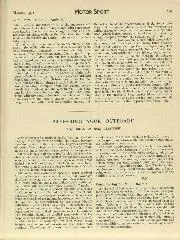
PREPARING YOUR OUTBOARD.
PREPARING YOUR OUTBOARD. SOME NOTES ON HULL TREATMENT. With an outboard motorboat outfit, " tuning " the hull is every bit as important as tuning the motor, because the skin…
WITH A BRITISH CAR ON THE CONTINENT.
wHILE the habit of travelling far afield is increasing among British motorists, there is still an idea that conditions on the more distant continental roads are too severe for the average British car. That this idea is mistaken is proven by the record of an ambitious tour, in the course of which no fewer than twenty frontier stations were negotiated and nearly 8,000 miles traversed in eight different countries successfully performed during the past summer by two Englishmen, Mr. Tim Dexter and Mr. J. A. OrrEwing on a Riley 9. The tour was undertaken partly for business and partly for pleasure purposes, and began with a journey up to Glasgow with the object of making a start from that city in the Czecho-Slovakian motor rally, which finished in the High Tatras mountains at Tatranska Lominca. The British entrants were successful in gaining the highest award in the rally, in spite of the strenuous nature of their journey ; the route lay south to London, thence to Dover, Calais, Paris, Nancy, Strasbourg, Freudenstadt and the Black Forest, Munich, Salzburg, Vienna, Buda-Pesth and the High Tatras. The rally concluded, Bratislava was visited, and there, faced with the necessity of travelling both north to Berlin and south again to Buda-Pesth, the travellers chose first to run up through Prague, Dresden and Leipzig to the German Capital, and then to travel back through Brunn, Vienna, Bratislava again to Buda-Pesth. Having completed their business in
Hungary, an exploration of the Tyrol was made in the neighbourhood of Klagenfurt and Villach, before going on to the Italinn frontier, Milan and Turin. During their stay in Italy, Messrs. Dexter and Ewing inspected the many motor factories in and around Milan, and then, crossing into Switzerland by the Great St. Bernard Pass, spent a brief holiday in Berne and among the lakes. The only trouble experienced throughout the tour was a broken petrol filter glass, caused by a stone thrown up by the wheels of the car. The British Port Dunlop tyres behaved themselves perfectly in spite of the atrocious roads which had to be covered, off the beaten track in Hungary and Czecho-Slovakia, on the official rally route, and in no country did they find the slightest difficulty in obtaining supplies of petrol and oil of the grade used at home. One of the principal features of their observations on continental travelling—of interest to future British tourists—is, that the familiar “bar & circle” sign of the Pratts High Test pumps is everywhere to be found, although the actual fuel may be known as Lampo, Esso, or by other names in different languages. Whatever the name, however, the spirit is exactly the same as that supplied at home, and the “bar i& circle” is a welcome reminder that one of the difficulties, at least, of foreign touring has been removed —the difficulty of obtaining a fuel suitable for our characteristic high speed, high efficiency British engines.
T. D.